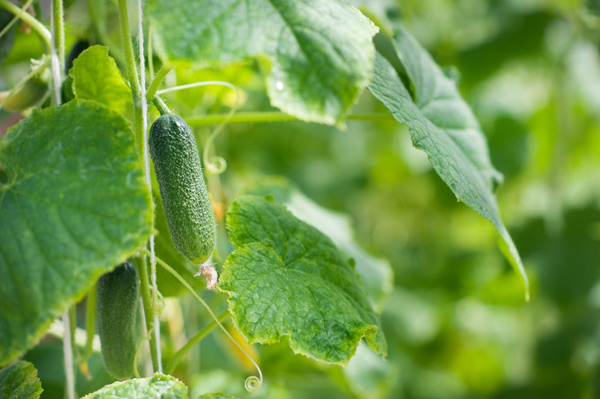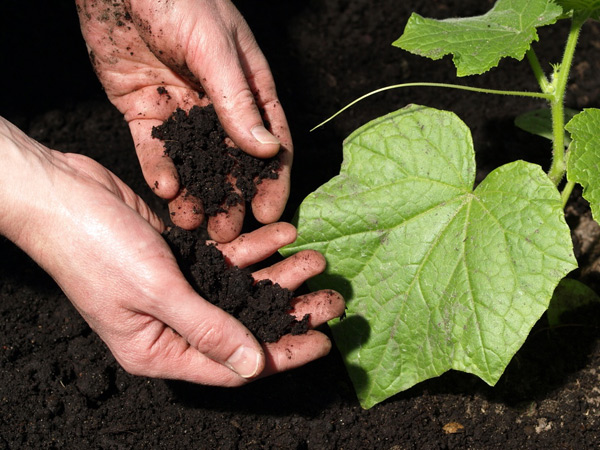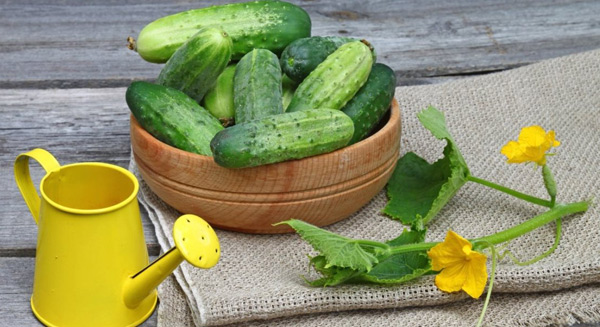How to fertilize cucumbers in the open field
Content:
Crispy cucumbers in summer are what you need. Therefore, many summer residents strive to grow as many cucumbers as possible in their area. However, not all lands are rich in nutrients and trace elements, so they need to be fertilized. It should be said that cucumbers are a very demanding crop, so they need special care, a special soil composition. This means that the cucumbers need to be fed on time. What fertilizers are there for cucumbers?
What to feed
As you know, there are three types of top dressing: mineral, organic and complex. And in order to choose the right fertilizer, you need to take into account the variety of cucumber, the type of components required for a cucumber in one or another phase of growth, as well as the possibilities of the soil.

Fertilizers for cucumbers: organic
As you may have guessed, organic fertilizers are natural residues, which means that they are completely safe for humans. Plus, organic fertilizers are very cheap and sometimes free. Unlike mineral fertilizers, organics need time to enrich the soil with certain nutrients. Therefore, organic matter is usually introduced into the ground in the fall. Remember that organic fertilizers make the soil light, loose, and well structured.
Compost
Summer residents love to make compost, which is laid out in layers in a pit, and then sprinkled with manure or earth. It is best to water the soil after composting. This is necessary in order for all nutrients to decompose and penetrate into the deep layers of the soil. However, it is best to apply compost in the fall, as nutrients are released only after six months. Cucumbers are very fond of compost, as it contains potassium, magnesium and nitrogen. However, compost has one drawback, it usually contains a lot of weed seeds and pest larvae, so it can cause some damage to the plant.
Manure
Manure is very often used for feeding. However, it is better to apply it only in a rotten state. It can also contain weed seeds and various infections, so it is undesirable to apply fresh manure to the soil.
It is best to use horse manure, as, for example, cow manure acidifies the earth. Poultry manure, which also contains potassium, nitrogen and other trace elements, is often added to the soil. But remember that it contains a lot of uric acid, so this organic matter should not be used in its pure form. Otherwise, you can simply burn the plants. Usually bird droppings are diluted in water or mixed with compost or peat, and then the beds are fertilized. Another cheap type of organic matter is green fertilizers.
Siderata
Siderata significantly improve the structure of the soil, enrich the soil with microelements, and also increase the number of earthworms. It is best to use clover, mustard or legumes as siderates.

Flour and ash
Bone meal and wood ash are often added to the ground. Bone meal contains a lot of phosphorus and calcium. And in the ash - iron, manganese and boron, as well as other trace elements. They are added to the soil to reduce acidity, usually diluted with water or mixed with soil in advance. There is no nitrogen in these fertilizers.
Fertilizers for cucumbers: mineral
Mineral fertilizers are quite popular nowadays. Basically, they are dissolved in water, and then watered with the resulting plant solution. Mineral fertilizers are usually divided into three large groups: phosphorus, potash and nitrogen.Nitrogen fertilizers are usually applied in early spring, they are necessary for plants in order for the latter to develop more actively. However, if you overfeed your crop with nitrogen fertilizer, you will do great harm to it. Potash fertilizers are usually applied in spring or autumn. Moreover, potash fertilizers are most preferable for cucumbers. They affect the color of plants as well as the quality of fruit formation.
Complex fertilizers, as you understand from the name, are formulations with different chemical elements. They are obtained by mixing various fertilizers. Currently, the following fertilizers are actively used by summer residents: nitroammofosk, nitrofosk and ammophos. The first contains phosphorus and nitrogen, the second contains potassium, phosphorus and nitrogen, and the third contains sulfur.
How to fertilize correctly
As we already wrote above, its effectiveness depends on the time of fertilization and the method. Therefore, you need to know when and how to feed the soil. By autumn, it is advisable to apply organic fertilizers, since in order for them to work, they need time. During the planting of cucumbers, straw or rotted manure is usually introduced into the hole. Moreover, it is important to cover the top with a layer of earth so that the plant does not have direct contact with organic fertilizers. Often, when planting, mineral fertilizers or ash are also applied.
After the shoots have appeared, it is better not to use organic fertilizers. When the first leaves appear, it is best to water the seedlings with a solution of superphosphate, urea and potassium sulfate. After that, ready-made complex mixtures are usually used. Moreover, each next feeding should be no earlier than 10 days from the previous one. However, two weeks before the immediate harvest, you need to stop any fertilization. For cucumbers, foliar dressing is also used, spraying the culture with solutions of organic or mineral fertilizers with a weak concentration.

Fertilizers for cucumbers: folk remedies
Very often, cucumbers are fed using folk methods. To do this, use an ash solution, yeast, iodine, honey, tinctures of onion husks or herbs. Ash is used to deoxidize the soil. Usually, three tablespoons are diluted in a liter of water and water the cucumber bushes for 10 days.
Yeast must also be pre-diluted in water, and then allowed to ferment, and then water the plants. You can add more sugar to this top dressing. Cucumbers should be sprayed with a solution of honey in order to increase their immunity and resistance to many diseases. Iodine also protects cucumbers from many diseases and repels pests. Usually 10 drops of iodine are diluted in a bucket of water and water or spray the cucumber bush with the resulting solution, onion peel tincture also increases the immunity of cucumbers, and also repels pests. A handful of husks are boiled in one and a half liters of water and insisted, and then diluted in more water and watered cucumbers once every few weeks.
For special occasions
If your cucumbers do not grow well, then it is advisable to apply nitrogen-containing fertilizers and boron. You can try watering the plants with yeast solution. If the leaves of the cucumbers turn yellow. This means that it is time to water the cucumbers with a soda solution. To prepare this composition, you need to dilute one tablespoon of baking soda in a bucket of water and pour over the cucumbers. You can also use a solution with the addition of kefir for this. Remember that it is impossible to simultaneously apply nitrogen fertilizers and ash to the soil, since cucumbers may die from this feeding. Fertilize after watering. Best fed in the evening or morning. And also remember that it is not advisable to use fertilizer after the expiration date. Feed the cucumbers correctly and crunch them with fresh green cucumbers!

